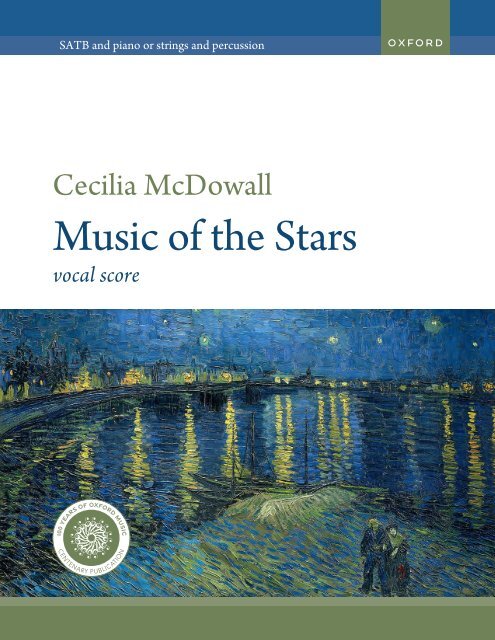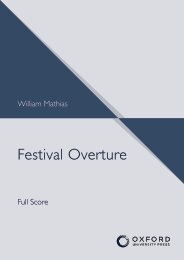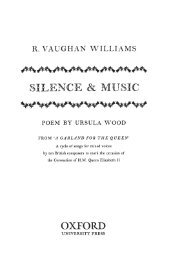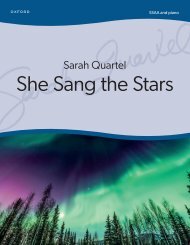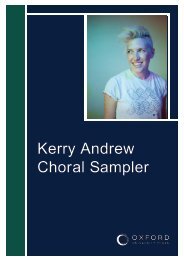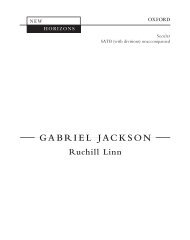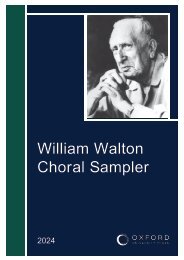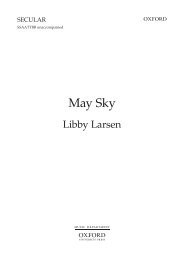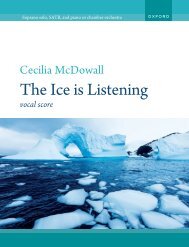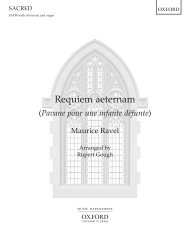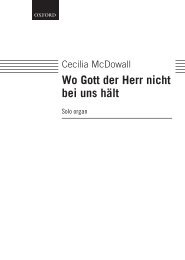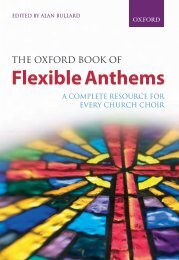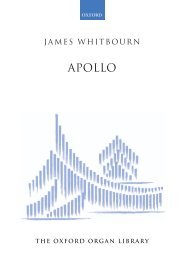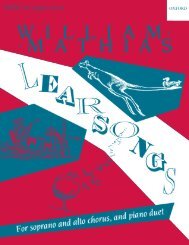Cecilia McDowall Music of the Stars
for SATB and piano or strings and percussion Music of the Stars offers an enlightening commentary on the power of music to console and uplift in challenging times. Characterful string writing accompanies the engaging vocal lines, with McDowall artfully employing vibraphone, glockenspiel, and suspended cymbal to sprinkle a touch of celestial sparkle throughout the score. An excerpt from a folksong from Ukraine is woven into the first movement's gentle setting of Kenyan poet Brian Odongo's atmospheric depiction of the music of the ancient stars that watch over humanity below. The second, up-tempo movement presents American astrophysicist Neil deGrasse Tyson's absorbing explanation of 'light' and how we perceive it. Lastly, the affirmatory final movement sets American writer James Weldon Johnson's well-known text 'The Gift to Sing', drawing the piece to a close with the emphatic, joyful statement: 'And I can sing'.
for SATB and piano or strings and percussion
Music of the Stars offers an enlightening commentary on the power of music to console and uplift in challenging times. Characterful string writing accompanies the engaging vocal lines, with McDowall artfully employing vibraphone, glockenspiel, and suspended cymbal to sprinkle a touch of celestial sparkle throughout the score. An excerpt from a folksong from Ukraine is woven into the first movement's gentle setting of Kenyan poet Brian Odongo's atmospheric depiction of the music of the ancient stars that watch over humanity below. The second, up-tempo movement presents American astrophysicist Neil deGrasse Tyson's absorbing explanation of 'light' and how we perceive it. Lastly, the affirmatory final movement sets American writer James Weldon Johnson's well-known text 'The Gift to Sing', drawing the piece to a close with the emphatic, joyful statement: 'And I can sing'.
Create successful ePaper yourself
Turn your PDF publications into a flip-book with our unique Google optimized e-Paper software.
SATB and piano or strings and percussion<br />
<strong>Cecilia</strong> <strong>McDowall</strong><br />
<strong>Music</strong> <strong>of</strong> <strong>the</strong> <strong>Stars</strong><br />
vocal score
<strong>Cecilia</strong> <strong>McDowall</strong><br />
<strong>Music</strong> <strong>of</strong> <strong>the</strong> <strong>Stars</strong><br />
for online perusal only<br />
for SATB and piano or strings and percussion<br />
vocal score<br />
watch <strong>the</strong> premiere performance:
Great Clarendon Street, Oxford OX2 6DP,<br />
United Kingdom<br />
Oxford University Press is a department <strong>of</strong> <strong>the</strong> University <strong>of</strong> Oxford.<br />
It fur<strong>the</strong>rs <strong>the</strong> University’s objective <strong>of</strong> excellence in research, scholarship,<br />
and education by publishing worldwide. Oxford is a registered trade mark <strong>of</strong><br />
Oxford University Press in <strong>the</strong> UK and in certain o<strong>the</strong>r countries<br />
This work © Oxford University Press 2023<br />
<strong>Cecilia</strong> <strong>McDowall</strong> has asserted her right under <strong>the</strong> Copyright, Designs<br />
and Patents Act, 1988, to be identified as <strong>the</strong> Composer <strong>of</strong> this Work<br />
First published 2023<br />
Impression: 1<br />
All rights reserved. No part <strong>of</strong> this publication may be reproduced,<br />
stored in a retrieval system, or transmitted, in any form or by any means,<br />
without <strong>the</strong> prior permission in writing <strong>of</strong> Oxford University Press<br />
Permission to perform this work in public (except in <strong>the</strong> course <strong>of</strong> divine worship)<br />
should normally be obtained from a local performing right licensing organization,<br />
unless <strong>the</strong> owner or <strong>the</strong> occupier <strong>of</strong> <strong>the</strong> premises being used already holds a licence<br />
from such an organization. Likewise, permission to make and exploit a recording <strong>of</strong> this work<br />
should be obtained from a local mechanical copyright licensing organization<br />
Enquiries concerning reproduction outside <strong>the</strong> scope <strong>of</strong> <strong>the</strong> above<br />
should be directed to <strong>the</strong> <strong>Music</strong> Rights Department, Oxford University Press,<br />
at music.permissions.uk@oup.com or at <strong>the</strong> address above<br />
ISBN 978–0–19–356428–2<br />
<strong>Music</strong> origination by Anna Williams<br />
Text origination by Katie Johnston<br />
Printed in Great Britain on acid-free paper by<br />
Halstan & Co. Ltd, Amersham, Bucks.<br />
for online perusal only
Contents<br />
Composer’s note<br />
Texts<br />
iv<br />
v<br />
1. <strong>Music</strong> <strong>of</strong> <strong>the</strong> <strong>Stars</strong> 1<br />
2. The hardest thing 12<br />
3. The Gift to Sing 24<br />
for online perusal only<br />
Duration: 13 minutes<br />
Instrumentation<br />
percussion—1 player (vibraphone, glockenspiel, suspended cymbal)<br />
strings<br />
Full scores and instrumental parts are available on hire/rental.<br />
If required, <strong>the</strong> work may also be accompanied by piano, playing from <strong>the</strong> vocal score.
Composer’s note<br />
<strong>Music</strong> <strong>of</strong> <strong>the</strong> <strong>Stars</strong> was commissioned by long-time Chamber Singers <strong>of</strong> Iowa City member, James Petersen,<br />
and his spouse, David McCartney, to celebrate <strong>the</strong> Chamber Singers’ fiftieth season.<br />
James and David suggested a commission which could celebrate <strong>the</strong> power <strong>of</strong> music in <strong>the</strong>se difficult times.<br />
I was most touched to be <strong>of</strong>fered such a rewarding opportunity. Finding just <strong>the</strong> right text to set is such an<br />
interesting process and I felt this one was particularly engaging. In recognition <strong>of</strong> <strong>the</strong> racial issues which face<br />
us every day, <strong>the</strong> commissioners and music director, David Puderbaugh, <strong>of</strong>fered texts written by people <strong>of</strong><br />
colour: James Weldon Johnson and Kenyan-born Brian Odongo. The latter text was discovered by ano<strong>the</strong>r<br />
CSIC singer, Elaine Reding. To continue <strong>the</strong> <strong>the</strong>me <strong>of</strong> music, singing, and <strong>the</strong> stars, I discovered an absorbing<br />
explanation <strong>of</strong> ‘light’ and how we perceive it by <strong>the</strong> American astrophysicist Neil deGrasse Tyson. He is an<br />
outstanding science communicator and I found myself drawn to and fascinated by his planetary postings,<br />
which have a clarity I had not encountered before.<br />
for online perusal only<br />
The atmospheric text <strong>of</strong> <strong>the</strong> first movement, ‘<strong>Music</strong> <strong>of</strong> <strong>the</strong> <strong>Stars</strong>’, evokes ‘dark night clouds’, illuminated by<br />
ancient, radiant stars as <strong>the</strong>y watch over mortals’ adventures below; <strong>the</strong> ‘music <strong>of</strong> <strong>the</strong> stars’ sings to ‘seafarers,<br />
wayfarers, and soldiers’. There is a gentle, almost mesmerizing pace to <strong>the</strong> poem which I hope is reflected in<br />
<strong>the</strong> music. I wove just a small part <strong>of</strong> a Ukrainian folksong into this movement—In <strong>the</strong> garden flowers are<br />
growing, Boys will quarrel where I’m going—as it just seemed impossible to ignore <strong>the</strong> unfolding horror in<br />
Ukraine. I would be mortified if this seemed a posturing gesture but as I was writing I found it hard not to be<br />
affected by <strong>the</strong>se shocking events and to feel, at <strong>the</strong> same time, utterly powerless as a witness.<br />
In <strong>the</strong> text <strong>of</strong> <strong>the</strong> second, up-tempo movement, ‘The hardest thing’, Tyson explores <strong>the</strong> concept <strong>of</strong> how we<br />
analyse colour. Certainly, when reading Tyson’s explanation <strong>of</strong> how <strong>the</strong> universe is studied, one begins to<br />
sense what an extraordinarily complex science astrophysics is. Setting prose to music needs a different<br />
approach, I feel, and I aimed to bring a more conversational style to <strong>the</strong> word setting, sometimes repeating<br />
<strong>the</strong> little phrase endings, to give a little more emphasis.<br />
The poem ‘The Gift to Sing’ will be so familiar to many. I found this a wonderful poem to set; <strong>the</strong>re is<br />
something so quietly confident, so intimate and ultimately joyful about it. Each verse ends with a solution to<br />
<strong>the</strong> day’s challenges—‘I s<strong>of</strong>tly sing’; ‘And sing, and sing’; ‘And I can sing’. These heart-warming words bring<br />
an affirmation <strong>of</strong> what <strong>the</strong> power <strong>of</strong> singing can do for us all in times <strong>of</strong> difficulty. The text speaks to us all in<br />
<strong>the</strong>se most exacting times. How glorious it is, at last, to sing again. I do hope this work brings a response to<br />
<strong>the</strong> times in which we now live.<br />
This note may be reproduced as required for programme notes.<br />
Texts appear in <strong>the</strong> purchased vocal score<br />
iv
for online perusal only
for online perusal only
for online perusal only
for online perusal only
for online perusal only
for online perusal only
for online perusal only
for online perusal only
for online perusal only
for online perusal only
for online perusal only
for online perusal only
for online perusal only
for online perusal only
for online perusal only
for online perusal only
for online perusal only
for online perusal only
for online perusal only
for online perusal only
for online perusal only
for online perusal only
for online perusal only
for online perusal only
for online perusal only
for online perusal only
for online perusal only
for online perusal only
for online perusal only
for online perusal only
for online perusal only
for online perusal only
for online perusal only
for online perusal only
Photo: Karina Lyburn<br />
<strong>Music</strong> <strong>of</strong> <strong>the</strong> <strong>Stars</strong> <strong>of</strong>fers an enlightening commentary on <strong>the</strong> power <strong>of</strong> music to console and<br />
uplift in challenging times. Characterful string writing accompanies <strong>the</strong> engaging vocal<br />
lines, with <strong>McDowall</strong> artfully employing vibraphone, glockenspiel, and suspended cymbal<br />
to sprinkle a touch <strong>of</strong> celestial sparkle throughout <strong>the</strong> score. An excerpt from a folksong<br />
from Ukraine is woven into <strong>the</strong> first movement’s gentle setting <strong>of</strong> Kenyan poet Brian<br />
Odongo’s atmospheric depiction <strong>of</strong> <strong>the</strong> music <strong>of</strong> <strong>the</strong> ancient stars that watch over humanity<br />
below. The second, up-tempo movement presents American astrophysicist Neil deGrasse<br />
Tyson’s absorbing explanation <strong>of</strong> ‘light’ and how we perceive it. Lastly, <strong>the</strong> affirmatory final<br />
movement sets American writer James Weldon Johnson’s well-known text ‘The Gift to Sing’,<br />
drawing <strong>the</strong> piece to a close with <strong>the</strong> emphatic, joyful statement: ‘And I can sing’.<br />
Award-winning composer <strong>Cecilia</strong> <strong>McDowall</strong> is perhaps best known<br />
for her choral works, with <strong>the</strong>ir distinctive fusion <strong>of</strong> fluent melodic<br />
lines with occasional dissonance and rhythmic exuberance. Her<br />
music has been commissioned and performed worldwide by leading<br />
ensembles, including <strong>the</strong> BBC Singers, The Sixteen, and Oxford and<br />
Cambridge choirs. In 2020 The Ivors Academy presented <strong>McDowall</strong><br />
with <strong>the</strong> prestigious Ivor Novello Award for a ‘consistently excellent<br />
body <strong>of</strong> work’. She was commissioned to write a carol for <strong>the</strong> Choir<br />
<strong>of</strong> King’s College, Cambridge, as part <strong>of</strong> <strong>the</strong>ir 2021 Festival <strong>of</strong> Nine<br />
Lessons and Carols, which was broadcast worldwide.<br />
<strong>Music</strong> <strong>of</strong> <strong>the</strong> <strong>Stars</strong> McDOWALL<br />
Cover image: Vincent van Gogh, Starry Night Over <strong>the</strong> Rhône, 1888. Musée d’Orsay, Paris/Wikimedia<br />
ISBN 978-0-19-356428-2<br />
www.oup.com<br />
9 780193 564282


